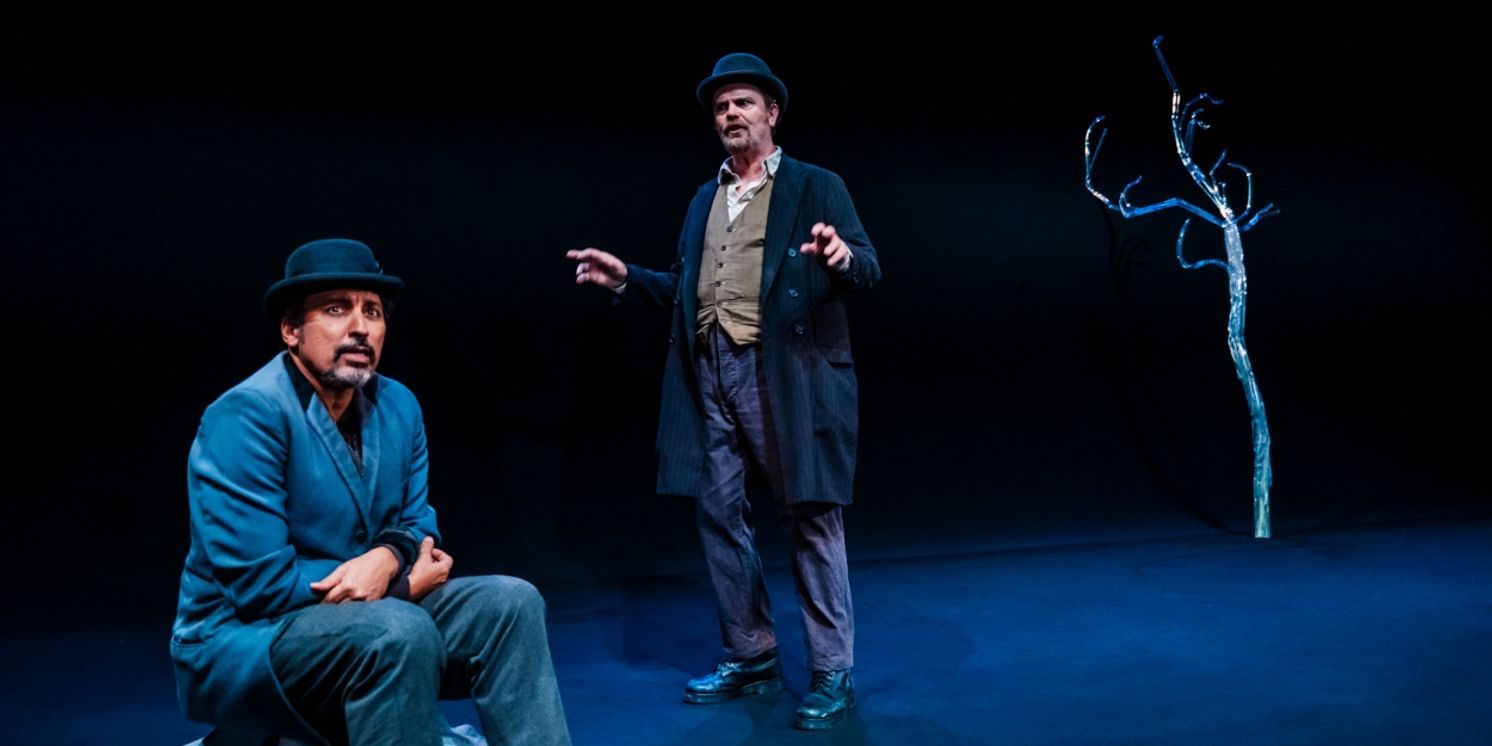Review: WAITING FOR GODOT at Geffen Playhouse
Rainn Wilson and Aasif Mandvi lead Beckett's glance at oblivion

They’re clowns, tramps, philosophers, nihilists. They are turnip-gathering, hat-passing hobos, shabby in their rumpled dignity. Vladimir and Estragon, AKA “Didi” and “Gogo.” In the eyes of playwright Samuel Beckett, these longtime friends staring down oblivion in WAITING FOR GODOT, they are all of us.
As embodied by Rainn Wilson and Aasif Mandvi in the revival of GODOT at The Geffen Playhouse, they are a formidable pair. Beckett’s play about the unknowable darkness of the human condition has - go figure! - long been catnip for comedians, and you get why Wilson (best known for THE OFFICE) and Mandvi (EVIL, THE DAILY SHOW) would want a whack at them. They’re in steady hands. The production’s director is a Beckett specialist: Judy Hegarty Lovett, whose Gare St Lazare Ireland is a co-producer. Having directed more than 23 productions of Beckett’s works, Hegarty Lovett has danced this waltz many times before. Her staging is, frankly, riveting. Given that we’re talking about a play in which absolutely nothing happens, that’s an achievement.
Here's a nugget of playgoing perspective and one reason why live stage is as unique as it is: how about the variety of experience you are treated to at the same venue when the lights go down? This first Geffen season programed by new artistic director Tarell Alvin McCraney, will open 2025 with Michael Frayn’s NOISES OFF, a backstage/frontstage theatrical comedy where everybody is running around in an absolute tizzy. The action in Frayn’s play never abates. In WAITING FOR GODOT, Didi and Gogo spend blocks of time on an empty stage staring at a barren tree. These actors embrace the silence, the nothingness because of the understanding that that is what we all must do in the end.
At the outset, at least, Wilson’s Didi is the optimist. He believes this vigil will end in an actual arrival of a person who is expected. Whenever Gogo inquires about this folly, Wilson’s steady reminders are business-like, without a skosh of exasperation: “Godot. We’re waiting for Godot.” Gogo is the one who more frequently suggests the two men part ways and go elsewhere, but to Didi (and frankly to Beckett), leaving this space is never really a choice, (although he occasionally has to dash off stage to empty his bladder or otherwise attend to his sour gut, drawing a leering chuckle from his friend). Estragon may well laugh, but he is less mobile. His boots are killing him; it’s a labor even to get them off his stinking feet. Both tramps are bearded with a lot more salt than pepper, Whenever Mandvi’s Gogo speaks, he sounds about 20 years older than he looks.
In addition to being gifted physical comedians, these two men - both in their late 50s – are clearly at ease together, which serves the play. We never know what brought Vladimir and Estragon together in the first place; now as the end draws near, they have stayed together and are stuck with each other. Wilson and Mandvi tap into both the co-dependent affection between them, but also into the impatience, occasionally bordering on exasperation (particularly from Mandvi’s put-upon Estragon). Didi needles, and Gogo takes it with a sigh or a roll of his eyes. “There’s an idea: let’s insult each other,” Gogo suggests at one point. Anything to make the time drip by, bring night closer along with the arrival of the man who can validate the wait. Simon Bennison’s lights take the action from the twilight of act 1 to the glare of the next day. Or maybe it’s the next day of the following week. The passage of time has few rules here in this wasteland, although the tree has a few leaves.
The play’s central happening is, in fact, an arrival – of the brutish Pozzo who snaps a loud whip and comes on stage driving his slave Lucky at the end of a long rope. Pozzo’s quest feels more grounded – he’s bound for the marketplace to sell the faithful Lucky - but the longer he tarries with Vladimir and Estragon, the less certain he becomes about anything. Conor Lovett (another veteran Beckett player as well as director Hegarty Lovett’s husband) is a delight to watch. He arrives all cocksuredness (“I am perhaps not particularly human, but who cares?”) but the doubt creeps in as he forges a connection with these two men. It’s not so much a transformation as a questioning. When he returns in the second act and ends up in a heap on the ground after loses his footing, Lovett’s Pozzo is laid as low as the rest of us.
Adam Stein’s rendering of Lucky is another revelation. The actor looks entirely broken as a beast of burden, shuffling and hunched over, bearing his master’s food basket. Then when commanded to “think!”, he drops a crazy nonsensical monologue in a soft and erudite voice.
Which – spoiler alert?! – pretty much covers the action of the play, apart from a visit from a boy (Lincoln Bonilla sharing the role with Jack McSherry) with an update about Godot’s progress. Otherwise, this is the Didi and Gogo show, two men at a crossroads, facing oblivion with belts not long enough to hang themselves from that single tree.
NOISES OFF, this most certainly ain’t (that’s coming next), but for an artful exhibition of the absurd, the Geffen and Gare St Lazare GODOT delivers.
WAITING FOR GODOT continues through December 15 at 10886 Le Conte Avenue, L.A.
Photo of Aasif Mandvi and Rainn Wilson by Jeff Lorch
Reader Reviews

Videos

